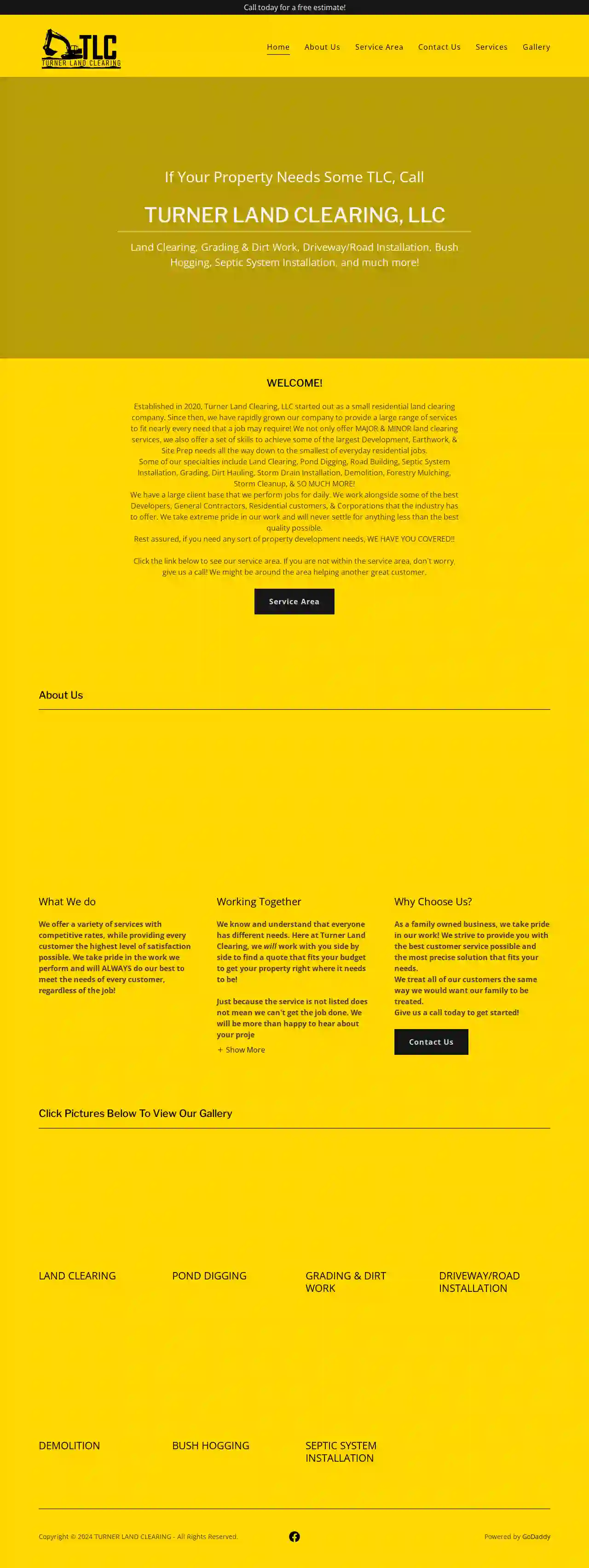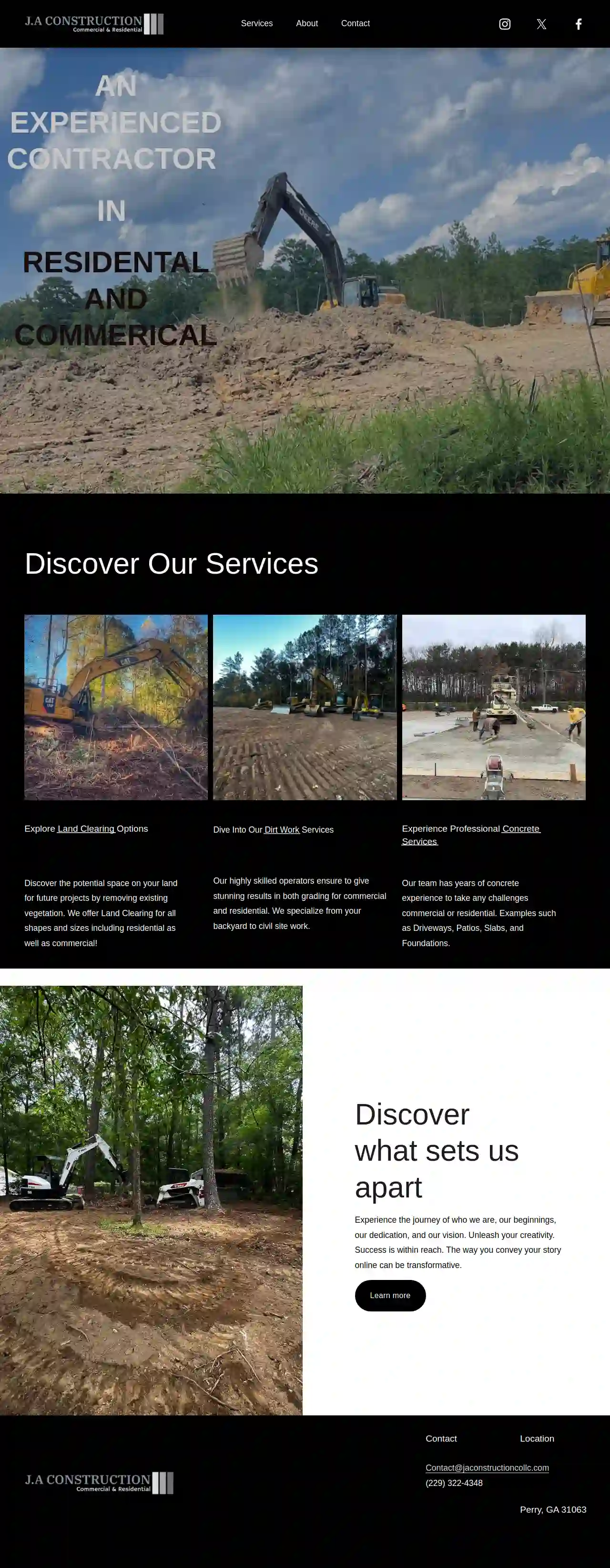Excavation Contractors Gainesville
Best Excavating Contractor in Gainesville
Receive 3 FREE Excavating Contractors quotes for your project today! Compare profiles, reviews, accreditations, portfolio, etc... and choose the best service.
- Di
Dig Earth Works
51 reviewsAtlanta, US- Services
- Why Us?
Get Quote 
Turner Land Clearing, LLC
52 reviewsTownsend, GA, 31331, USAbout Turner Land Clearing, LLC Established in 2020, Turner Land Clearing, LLC began as a small residential land clearing company. Since then, we've expanded rapidly to offer a wide range of services, catering to almost any project need. We specialize in both major and minor land clearing, and we possess the skills to handle large-scale development, earthwork, and site preparation projects, as well as smaller everyday residential jobs. Our expertise encompasses Land Clearing, Pond Digging, Road Building, Septic System Installation, Grading, Dirt Hauling, Storm Drain Installation, Demolition, Forestry Mulching, Storm Cleanup, and much more! We work with a diverse client base, including Developers, General Contractors, Residential customers, and Corporations, and we take immense pride in our work, always striving for the highest quality. If you have any property development needs, we've got you covered! Check out our service area below. If you're outside the service area, don't hesitate to call us. We might be nearby assisting another satisfied customer.
- Services
- Why Us?
- Gallery
Get Quote- Ke
Kennedy Excavation
54 reviewsColumbus, US- Services
- Why Us?
Get Quote - At
Atlanta Excavation
1Atlanta, US- Services
- Why Us?
Get Quote 
J.A Construction
510 reviewsPerry, 31063, USWelcome to J.A Construction Discover our exceptional services and craftsmanship. Our team is trained and disciplined to give customers the best of the best. We are dedicated to providing top-notch quality and satisfaction to our clients. Book your appointment today and let us bring your vision to life.Transform your space with J.A Construction - where expertise meets excellence.
- Services
- Why Us?
- Gallery
Get Quote- Je
Jerry Cheshire Land Clearing
1Atlanta, US- Services
- Why Us?
Get Quote - Ro
Rowe's Land Clearing
4.52 reviewsSavannah, US- Services
- Why Us?
Get Quote - El
Elite Georgia Land Services
1Atlanta, US- Services
- Why Us?
Get Quote 
TAC Land Services
52 reviewsSavannah, USAbout TAC Land Services TAC Land Services is a local, multi-service business specializing in all things land. Our mission is to turn your dream property into a reality. From clearing home sites to preparing new land for agriculture use, TAC Land Services has your land clearing & maintenance needs covered. TAC Land Services serves all of Bulloch and the surrounding counties in Southeast Georgia. We have over 13 years experience in agriculture and land clearing & maintenance. Land is one of the best investments you can make, and TAC Land Services is dedicated to improving and maintaining the value and beauty of your property. Feel free to call, text, or email.
- Services
- Why Us?
- Gallery
Get Quote- Co
Contractors South Inc
3.86 reviewsAugusta, US- Services
- Why Us?
Get Quote
Over 21,512+ Excavation Pros on our directory
Our excavation contractors operate in Gainesville and beyond!
ExcavationHQ has curated and vetted the Best Excavation Pros in and around Gainesville. Find a top & reliable business today.
Frequently Asked Questions About Excavation Contractors
- Trench Collapses: Unstable trench walls can cave in, posing a severe risk to workers. Proper shoring and sloping are crucial safety measures.
- Utility Damage: Striking underground utilities (gas, water, electric) can cause leaks, explosions, or electrocution. Accurate utility locates and careful digging are essential.
- Falling Objects: Materials or equipment falling into excavations can injure workers. Securing work areas and using appropriate safety gear is vital.
- Equipment Accidents: Operating heavy machinery involves risks of rollovers, collisions, or mechanical failures. Trained operators and proper equipment maintenance are critical.
- Environmental Hazards: Excavated soil might contain hazardous materials (asbestos, lead). Proper testing and disposal procedures are necessary.
- Basement Size: The larger the basement, the more excavation is required, increasing the cost.
- Soil Type: Excavating rocky or dense clay soil is generally more expensive than loose soil.
- Accessibility: Difficult-to-access sites might require specialized equipment or more labor, driving up costs.
- Foundation Type: The chosen foundation type (full basement, crawl space, slab) affects excavation needs.
- Underpinning: If underpinning (strengthening existing foundations) is necessary, it significantly increases costs.
- Disposal Fees: Hauling excavated soil to disposal sites adds to the overall expense.
- Project Size and Scope: The larger and more complex the excavation, the higher the cost.
- Soil Type: Different soil types require different equipment and techniques, impacting costs. Rocky or clay-rich soil can be more expensive to excavate than loose soil.
- Accessibility: Difficult-to-access sites might require specialized equipment or additional labor, increasing expenses.
- Disposal Costs: Hauling away excavated material (soil, rocks, etc.) to disposal sites incurs additional fees.
- Permits and Inspections: Depending on local regulations, permits and inspections might be required, adding to the overall cost.
- Mechanical Excavation: Utilizing heavy equipment like excavators, backhoes, bulldozers, and loaders, suitable for most projects.
- Hand Excavation: Using hand tools (shovels, picks) for smaller excavations or delicate work near utilities.
- Blasting: Employing explosives to break up rock or hard materials, typically for large-scale projects.
- Hydro Excavation: Using high-pressure water jets to loosen and remove soil, often used for locating utilities or delicate excavation.
- Vacuum Excavation: Employing a vacuum system to suck up excavated material, suitable for safe excavation near utilities or in confined spaces.
What are the risks associated with excavation?
How much does it cost to excavate a basement?
How much does excavation cost?
What are the different methods of excavation?
What are the risks associated with excavation?
- Trench Collapses: Unstable trench walls can cave in, posing a severe risk to workers. Proper shoring and sloping are crucial safety measures.
- Utility Damage: Striking underground utilities (gas, water, electric) can cause leaks, explosions, or electrocution. Accurate utility locates and careful digging are essential.
- Falling Objects: Materials or equipment falling into excavations can injure workers. Securing work areas and using appropriate safety gear is vital.
- Equipment Accidents: Operating heavy machinery involves risks of rollovers, collisions, or mechanical failures. Trained operators and proper equipment maintenance are critical.
- Environmental Hazards: Excavated soil might contain hazardous materials (asbestos, lead). Proper testing and disposal procedures are necessary.
How much does it cost to excavate a basement?
- Basement Size: The larger the basement, the more excavation is required, increasing the cost.
- Soil Type: Excavating rocky or dense clay soil is generally more expensive than loose soil.
- Accessibility: Difficult-to-access sites might require specialized equipment or more labor, driving up costs.
- Foundation Type: The chosen foundation type (full basement, crawl space, slab) affects excavation needs.
- Underpinning: If underpinning (strengthening existing foundations) is necessary, it significantly increases costs.
- Disposal Fees: Hauling excavated soil to disposal sites adds to the overall expense.
How much does excavation cost?
- Project Size and Scope: The larger and more complex the excavation, the higher the cost.
- Soil Type: Different soil types require different equipment and techniques, impacting costs. Rocky or clay-rich soil can be more expensive to excavate than loose soil.
- Accessibility: Difficult-to-access sites might require specialized equipment or additional labor, increasing expenses.
- Disposal Costs: Hauling away excavated material (soil, rocks, etc.) to disposal sites incurs additional fees.
- Permits and Inspections: Depending on local regulations, permits and inspections might be required, adding to the overall cost.
What are the different methods of excavation?
- Mechanical Excavation: Utilizing heavy equipment like excavators, backhoes, bulldozers, and loaders, suitable for most projects.
- Hand Excavation: Using hand tools (shovels, picks) for smaller excavations or delicate work near utilities.
- Blasting: Employing explosives to break up rock or hard materials, typically for large-scale projects.
- Hydro Excavation: Using high-pressure water jets to loosen and remove soil, often used for locating utilities or delicate excavation.
- Vacuum Excavation: Employing a vacuum system to suck up excavated material, suitable for safe excavation near utilities or in confined spaces.